|
|
|
Sort Order |
|
|
|
Items / Page
|
|
|
|
|
|
|
| Srl | Item |
| 1 |
ID:
154606
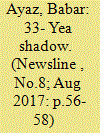

|
|
|
| 2 |
ID:
140921
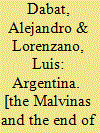

|
|
|
|
|
| Publication |
Mexico City, Conflicto Malvinense y Crisis Nacional, 1982.
|
| Description |
205p.pbk
|
| Standard Number |
0860910857
|
|
|
|
|
|
|
|
|
|
|
|
Copies: C:1/I:0,R:0,Q:0
Circulation
| Accession# | Call# | Current Location | Status | Policy | Location |
| 025469 | 982.064/DAB 025469 | Main | On Shelf | General | |
|
|
|
|
| 3 |
ID:
046855
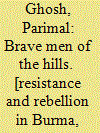

|
|
|
|
|
| Publication |
New Delhi, Manohar, 2000.
|
| Description |
197p.hbk
|
| Standard Number |
8173042314
|
|
|
|
|
|
|
|
|
|
|
|
Copies: C:1/I:0,R:0,Q:0
Circulation
| Accession# | Call# | Current Location | Status | Policy | Location |
| 044083 | 959.1/GHO 044083 | Main | On Shelf | General | |
|
|
|
|
| 4 |
ID:
089353
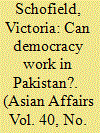

|
|
|
|
|
| Publication |
2009.
|
| Summary/Abstract |
The author argues that military rule has never been good for Pakistan. Historically it has not helped the fight against extremism, On the contrary, the generals' search for some sort of legitimacy has tended to give encouragement to militant Islam. Certainly, the democratic road has been difficult in many countries, but there is no alternative. It is the only road for Pakistan. The West should not give support to anti-democratic forces under the mistaken belief that they can provide firm government.
|
|
|
|
|
|
|
|
|
|
|
|
|
|
|
|
| 5 |
ID:
129652
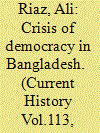

|
|
|
|
|
| Publication |
2014.
|
| Summary/Abstract |
Since its independence in 1971, Bangladesh has experienced tumultuous times. The country endured prolonged military rule from 1975 to 1990, but democratic aspirations have defined the course of its politics. In the past four decades, Bangladesh has experimented with various systems of governance, including one party presidential rule and, currently, a multiparty parliamentary system, having returned to parliamentary democracy in 1991. Bangladesh has demonstrated favorable elements of democracy, such as high levels of political participation, a plethora of political parties, a growing middle class, a vibrant civil society, and periodic elections. Yet the nation has undergone repeated reversals of democratic gains, thanks to civilian authoritarianism and military dictatorship. The polity has suffered from an absence
of strong institutions to ensure the rule of law, accountability, and transparency in governance.
|
|
|
|
|
|
|
|
|
|
|
|
|
|
|
|
| 6 |
ID:
140364


|
|
|
|
|
| Summary/Abstract |
Since independence, Bangladesh has rotated between electrol democracy and military rule, and betwwen parliamentary and presidential forms of government.
|
|
|
|
|
|
|
|
|
|
|
|
|
|
|
|
| 7 |
ID:
121666


|
|
|
|
|
| Publication |
2013.
|
| Summary/Abstract |
After five decades in which military dominance defined post-colonial politics, Burma has recently embarked on a long-delayed process of political reform. The gradual democratisation of the country's political institutions has meant that the history of its two twentieth-century coups is increasingly overlooked. This article presents a focused study of military interventionism in Burma and offers explanations for the successful entrenchment of military rule. The mindset of the military leadership and its success at sidelining opponents is explored alongside a preliminary consideration of the role that international support has played. Crucially, military leaders have been exasperated by what they consider feeble (and foreign-controlled) civilian authorities that have been incapable of preventing national fragmentation. This mindset, plus effective repression and support by neighbouring countries such as China, formed the basis of the military's rule. Therefore, the prospects of future democratisation efforts will rely on a fuller understanding of the processes that led the armed forces to exert consistent dominance.
|
|
|
|
|
|
|
|
|
|
|
|
|
|
|
|
| 8 |
ID:
063450


|
|
|
| 9 |
ID:
142703
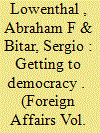

|
|
|
|
|
| Summary/Abstract |
Almost five years ago, mass protests swept the Egyptian autocrat Hosni Mubarak from power. Most local and foreign observers believed that Egypt was on the path to a democratic future; some even proclaimed that democracy had arrived. But the election of Mohamed Morsi and the Muslim Brotherhood’s Freedom and Justice Party led to polarization and violence, and in 2013, after more mass protests, General Abdel Fattah el-Sisi seized power in a military coup. Since then, Sisi’s regime has killed more than 1,000 civilians, imprisoned tens of thousands more, and cracked down on media and civil society.
|
|
|
|
|
|
|
|
|
|
|
|
|
|
|
|
| 10 |
ID:
117910
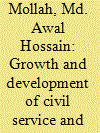

|
|
|
|
|
| Publication |
2011.
|
| Summary/Abstract |
The aim of this article is to analyse the growth and development of bureaucracy as an institution of government in Bangladesh from historical and politico-administrative perspectives. Although it is now an independent state, various Hindu kings, Muslim emperors, British lords and zamindars of the Indian subcontinent ruled the area of Bangladesh for several hundred years. In 1947, when India and Pakistan emerged as independent states, Bangladesh was a part of Pakistan. To understand the growth and development of bureaucracy in Bangladesh, the article is divided into two broad sections: the colonial legacy of both British India and Pakistan (1601-1971) and the Bangladesh period (1971-2008). The structure and working patterns of bureaucracy in Bangladesh are a legacy of British colonial rule, which impeded reform efforts after Independence and caused politicisation of the administration and governance. Civil-military elitisms reduced accountability of the administration, resulting in a dominating bureaucratic structure with corruption.
|
|
|
|
|
|
|
|
|
|
|
|
|
|
|
|
| 11 |
ID:
121936
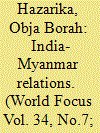

|
|
|
|
|
| Publication |
2013.
|
| Summary/Abstract |
India's relations with Myanmar have undergone several changes. During the early decades of military rule in Myanmar, India, wanted to tread the moral high ground and stand up for democracy and human rights, and thus ended up losing much-valued strategic space to China.
|
|
|
|
|
|
|
|
|
|
|
|
|
|
|
|
| 12 |
ID:
141023
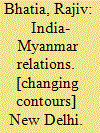

|
|
|
|
|
| Publication |
New Delhi, Routledge, 2016.
|
| Description |
xxi, 257p.: tables, mapshbk
|
| Standard Number |
9781138191327
|
|
|
|
|
|
|
|
|
|
|
|
Copies: C:1/I:0,R:0,Q:0
Circulation
| Accession# | Call# | Current Location | Status | Policy | Location |
| 058324 | 327.5409591/BHA 058324 | Main | On Shelf | General | |
|
|
|
|
| 13 |
ID:
129170


|
|
|
| 14 |
ID:
142229
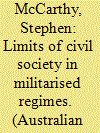

|
|
|
|
|
| Summary/Abstract |
The nature of civil society is transformed by a strong military presence, which occurs in the Asia-Pacific region. While modern civil society survives under military rule through co-optation, veiled resistance or geography, traditional organisations may continue to threaten the state's dominance of political society. This article examines the nature of civil society in two countries in the Asia-Pacific that have recently emerged from direct military rule—Burma and Fiji. It considers the independence of civil society under military rule, how militaries take steps to safeguard their roles in political society, and how democratic postures change during transitions away from military rule. Understanding how militaries preserve their influence provides a better perspective of authoritarian resilience in the region and the limits to democratic reforms.
|
|
|
|
|
|
|
|
|
|
|
|
|
|
|
|
| 15 |
ID:
047148
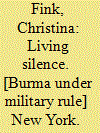

|
|
|
|
|
| Publication |
New York, Zed Books, 2001.
|
| Description |
xiii, 286p.pbk
|
| Standard Number |
185649926X
|
|
|
|
|
|
|
|
|
|
|
|
Copies: C:1/I:0,R:0,Q:0
Circulation
| Accession# | Call# | Current Location | Status | Policy | Location |
| 044688 | 959.1/FIN 044688 | Main | On Shelf | General | |
|
|
|
|
| 16 |
ID:
089475


|
|
|
|
|
| Publication |
2009.
|
| Summary/Abstract |
The 3 August 2005 military coup was Mauritania's best opportunity to turn the page on decades of the deposed quasi-military regime's destructive politics. This article critically analyses relevant aspects of the transition that ensued in the context of the prevailing models of military withdrawal from politics in Africa. It also examines the challenges that Mauritania's short-lived Third Republic faced. It argues that the transition process did not escape the well-known African military junta leader's proclivity to manipulate transitions to fulfil suddenly awakened self-seeking political ambitions, in violation of solemn promises. While there was no old-fashioned ballot stuffing to decide electoral outcomes, Mauritania's junta leader and his lieutenants spared no effort to keep the military very much involved in politics, and to perpetuate a strong sense of entitlement to political power. Originally designed as an ingenious 'delayed self-succession' of sorts, in the end, another coup aborted Mauritania's democratisation process and threw its institutions in a tailspin. This only exacerbated the challenges that have saddled Mauritania's political system and society for decades - unhealthy civil-military relations, a dismal 'human rights deficit', terrorism, and a neo-patrimonial, disastrously mismanaged economy.
|
|
|
|
|
|
|
|
|
|
|
|
|
|
|
|
| 17 |
ID:
089351
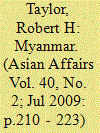

|
|
|
|
|
| Publication |
2009.
|
| Summary/Abstract |
The author argues that Western policy towards Myanmar over the last twenty years has been not only demonstrably ineffective, but has also completely ignored the admittedly somewhat hesitant efforts of the military regime to improve relations with the West. Although the regime has been presentationally inept, the generals do seem to be moving towards some sort of elections in 2010. The West will need to decide how to respond to those elections. Continuing total condemnation of the regime may not be the best option.
|
|
|
|
|
|
|
|
|
|
|
|
|
|
|
|
| 18 |
ID:
130647
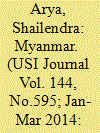

|
|
|
| 19 |
ID:
108360


|
|
|
| 20 |
ID:
117211
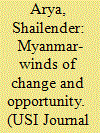

|
|
|
|
|
|
|
|